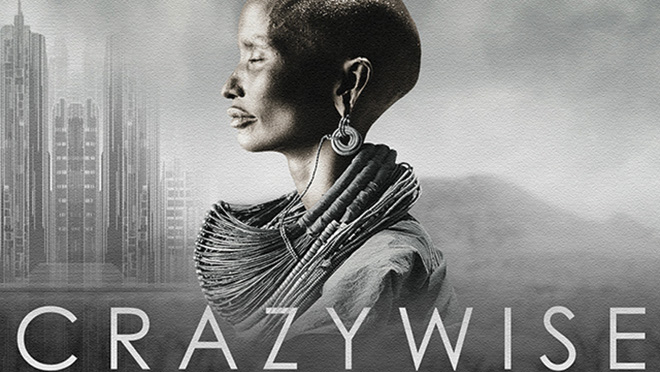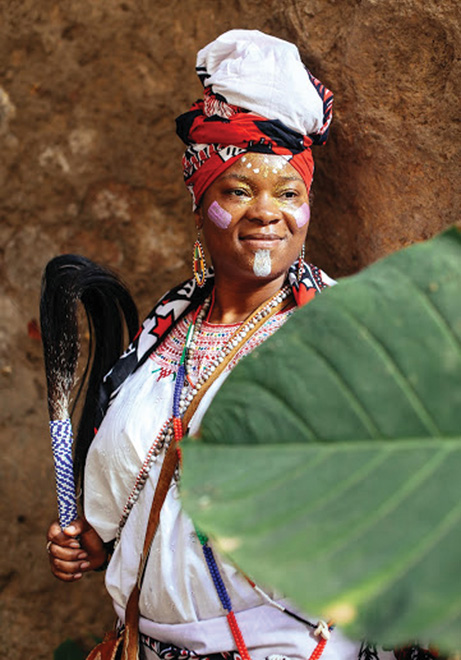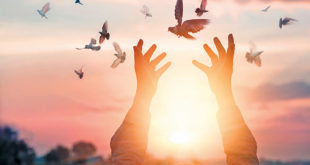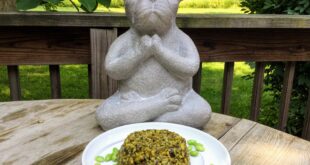
by Janae Jean and Spencer Schluter –
 This month, we had the pleasure of speaking with Gogo Ekhaya Esima of Sangoma Healing. Gogo Ekhaya was featured in the documentary, Crazywise, which focuses on the journey of two young people diagnosed with mental illnesses. Gogo Ekhaya is a trained sangoma or healer in the South African tradition. We spoke with her about the power of ancestral healing, alternative treatments for mental illness and the importance of removing the stigma of mental illness diagnosis.
This month, we had the pleasure of speaking with Gogo Ekhaya Esima of Sangoma Healing. Gogo Ekhaya was featured in the documentary, Crazywise, which focuses on the journey of two young people diagnosed with mental illnesses. Gogo Ekhaya is a trained sangoma or healer in the South African tradition. We spoke with her about the power of ancestral healing, alternative treatments for mental illness and the importance of removing the stigma of mental illness diagnosis.
This transcribed interview is only a portion of the complete interview. Subscribe to the Conscious Community Podcast to hear the entire conversation. — J.J
Janae: How did you get involved in the documentary, Crazywise?
Gogo Ekhaya: While I was going through my sangoma initiation, I was thinking about how mental health issues and people’s personal struggles should be documented in some way, like a film, especially when they are using different modalities for healing. I thought what a wonderful thing that would be. Maybe someday, I would do it. A month later, I heard about Crazywise, and I reached out and said, “Thank you for this wonderful thing you are doing.” One of the producers got back with me, and we began talking. I told them a little bit about my journey, and they were interested and coming to New York City to do an interview, and that’s how we got started.
Spencer: Can you explain what a sangoma is?
GE: Sure. Sangomas are the traditional healers from South Africa. They are what someone may call a “shaman.” They are the spiritual leaders of the community where people go for healing physical, mental, family and communal issues. They are the ones that conduct rituals and do the traditional medicines to help someone through their life’s journey. Over 60% of the population in South African still goes to traditional healers, as opposed to seeing Western medical doctors, or they do both.
JJ: How did you come into the field?
GE: No one chooses to become a sangoma. It’s definitely a calling. This journey led me from experiencing a lot of suffering… a lot of mental health imbalances by way of depression and suicidal ideation, hearing voices, seeing things that other people didn’t see or what other people weren’t able to see, what some people would call “psychosis.” I was being treated in Western medicine; I was in and out of psych wards. At some point, I was able to reach the peer world, which is a mental health community of people with lived experiences. Those people with lived experiences help other people become involved and reintegrated into the community after a long-term hospitalization or long-term struggle with mental health imbalances. I reached out to a peer organization and that helped me to see for the first time that it wasn’t something that… You know, the doctors tell you that you’re going to be on medication for the rest of your life. This is a sickness that’s a long-term thing; there’s no cure. Something within me really rebelled against that and decided I was going to go out and search.
So, I found this beautiful peer world in the mental health system. I became a peer mental health counselor. I got some training in that. As I moved forward, I was able to reach out to someone. I felt very called to traditional methods of healing… shamanism, different herbal medicines. I was really researching it, and my heart-strings were pulling really hard. I found this beautiful lady who was doing a podcast on BlackTalkRadio. She was an African priestess, and she was also a sangoma. Her words really resonated with me. At the time, I could really sense an emergence coming through me, kind of bubbling over. I decided to reach out to her to get ancestral divination. She told me through this oracle reading from the African perspective. She only asked me my first name, last name and last name of my parents. She as able to read my life from beginning to present and told me things that no one else really knew about me. She also told me that all of my issues, especially my issues with mental health, were a sign of the shamanic calling to be a sangoma. That truly hit home for me, and that’s how I started on the journey.
SS: Do you think that learning about ancestral practices has value for the wider black community?
GE: That’s a beautiful question actually. There’s been a lot of films lately with people of color going back to the ancestors. We’ve recently had the children’s film, Coco, and also Black Panther. I really feel like people really are getting away from the stigma that has been created around ancestral veneration or ancestral contact. For African people and African-Americans, through the slave trade, we lost our drums so-to-speak. We lost our identity. We lost the remembrance of our practices and our culture in some way, in a really big way. It’s been really beautiful to see African-Americans really start to take interest in remembering who they are; remembering who we are as a collective whole and how important our ancestral ways were to mind, body and spirit, our families and communities.
The ancestral ways, ancestral veneration and ancestral contact, were involved in almost every aspect of life, through different rites of passage. When a child was born, you were able to identify why the child was coming in by contacting the ancestral guardians to see what their life’s purpose was, what their name should be. As they went into adolescence and adulthood, there were rites… all dealing with the ancestors. Even with marriage and death, ancestors were very much involved in guiding and helping us with our lives. Because we’ve lost that, we’ve kind of stopped remembering our power. Now I feel like this is the time when we are really re-awakening something that feels new but is very much ancient and very much a part of our culture. I think that it is absolutely important, and I’m really excited that it’s being displayed in such beautiful ways in the media.
Janae Jean serves as editor, social media manager and podcaster for Conscious Community Magazine. She has an extensive background in new media and music education. Janae is actively researching using electronically generated sounds for healing. Visit www.janaejean.com and www.perennialmusicandarts.com for details about Janae’s upcoming classes, lesson information, workshops, shows, articles and projects.
Spencer Schluter is the advertising account manager, social media manager and podcaster for Conscious Community Magazine. His experience includes visual communications, advertising, social media, marketing, public relations and business development. Visit www.yggstudios.com for more information about his freelance design and consulting work. He is also a master level Reiki and traditional Chinese Qigong practitioner.
Podcast: Play in new window | Download
Subscribe: RSS
 Conscious Community Magazine Dedicated to Elevating Consciousness
Conscious Community Magazine Dedicated to Elevating Consciousness





Thanks for the marvelous posting! I certainly enjoyed reading
it, you can be a great author. I will make certain to
bookmark your blog and will come back in the future.
I want to encourage you continue your great job,
have a nice afternoon!